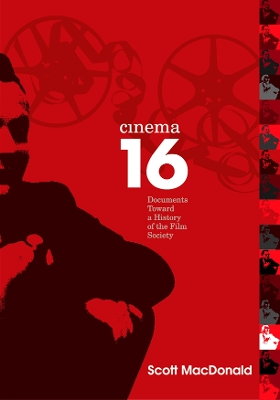Wide Angle Books
2 total works
As the most successful and influential film society in American history, Cinema 16 was a crucial organization for the creation of a public space for the full range of cinema achievement in the years following World War II. A precursor of the New York Film Festival, Cinema 16 screenings became a gathering place for New Yorkers interested not only in cinema, but in the use of media in the development of a more complete, effective democracy. For seventeen years, many of the leading intellectuals and artists of the time came together as part of a membership society of thousands to experience the creative programming of Cinema 16 director, Amos Vogel. What audiences saw at Cinema 16 changed their lives and had an enduring impact not only on the New York City cultural scene, but nationwide. Vogel's distribution of landmark documentary and avant-garde films helped make a place for many films that could never have had commercial release, given the pressures of commercialism and censorship during the postwar era.
Vogel's commitment to the broadest range of cinema practice led him to develop a programming strategy, inherited from the European cine-club movement, that involved confronting audiences with such a wide range of cinematic forms that viewers left the theater considering not only the often remarkable films Vogel showed, but the place of Cinema itself in modern life. Cinema 16: Documents Toward a History of the Film Society is the first book on Cinema 16. Scott MacDonald provides a sense of the life and work of the society, using the complete Cinema 16 program announcements, selected letters between Vogel and the filmmakers whose films he showed; selections from the program notes that accompanied Cinema 16 screenings, theoretical essays by Vogel on curating independent cinema; conversations between MacDonald and Cinema 16 members; photographs and stills; and a variety of other documents.
Vogel's commitment to the broadest range of cinema practice led him to develop a programming strategy, inherited from the European cine-club movement, that involved confronting audiences with such a wide range of cinematic forms that viewers left the theater considering not only the often remarkable films Vogel showed, but the place of Cinema itself in modern life. Cinema 16: Documents Toward a History of the Film Society is the first book on Cinema 16. Scott MacDonald provides a sense of the life and work of the society, using the complete Cinema 16 program announcements, selected letters between Vogel and the filmmakers whose films he showed; selections from the program notes that accompanied Cinema 16 screenings, theoretical essays by Vogel on curating independent cinema; conversations between MacDonald and Cinema 16 members; photographs and stills; and a variety of other documents.
Uses primary documents from the annals of Art in Cinema, one of this country's most influential film societies, to reveal a crucial dimension of the history of American independent cinema.

